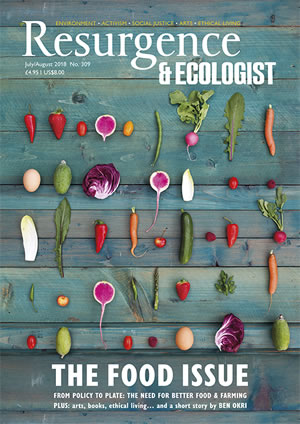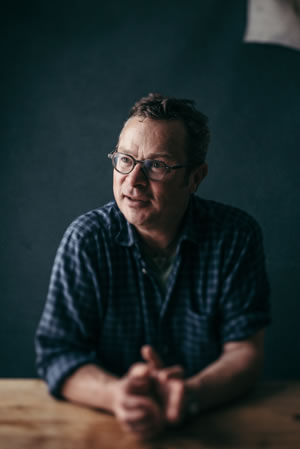Hugh Fearnley-Whittingstall is a man of many passions. To name but several: good food, less waste, healthier people, thriving Nature, and an end to human cruelty to animals. But there is one more that knits all three together: vegetables. Or rather, more vegetables. Or then again, many more vegetables!
How so? Because if we in the UK, and indeed a broader ‘we’ the world over, can be convinced to switch to a more vegetable-based diet, we will eat better, live longer, take pressure off the natural world, and reduce the daily suffering inflicted on farm animals. Hence the title of Hugh’s new book, Much More Veg, and his River Cottage festivals – the next is in August – named after his home on the Devon/Dorset border. Hence, too, his latest television documentary series on how many Britons’ dreadful diets underlie a major national crisis of obesity, diabetes, disability, massive NHS spending, and lives cut short.
“Looking into it has been scary at times, inspiring at others, and often gloomy. It is a startling truth that here in the UK we have one of the worst diets in the world,” Hugh tells me. “There aren’t the words to describe how bad our national eating habits have become. Half the food we eat is ultra-processed – and for some it’s as much as 90%. We are looking here at refined sugar, fat, flour and salt spun into endless combinations that are industrially tested to get us hooked. There’s hardly any fibre for the guts to get to work on. These foods deliver an avalanche of calories that’s more than our bodies can handle, and much of it just gets turned into fat.
“It’s obvious that the solution is to eat whole real food. So how do you get people to do that? It’s incredibly hard to persuade people to eat healthy food. One reason is the billions spent on persuading people to eat the bad stuff because that’s where the profit is. Literally billions. As for vegetables, yes, they are there on the supermarket shelves, but it’s still hard to compete against that massive advertising spend on junk food. And it’s especially difficult for people trying to make a living on low wages, working long hours, with rent or mortgages to pay, looking after families, looking for an easy way to fill their children’s bellies. Everything is against them. Families can and do turn things around – but it’s very hard.”
Another problem, he says, is that we have a generation of parents who rarely or never cook, relying instead on packaged foods and takeaways. “For a lot of people, cooking is a drudge, not ‘quality time’. But what if cooking is one of the things you do with your own time because you want to and see it as one of life’s pleasures? Then you are well on your way to eating better. If you can cook, you can cook healthy food, even on a tight budget, and you are in control of what you eat. That’s why we have to raise a generation that can cook again.
“Being a competent cook is a life-saving skill. If you’re out of work, or have a low-paying job, it is a lifeline. It confers extraordinary resilience in a world where economic challenges are growing. The idea that we could raise a generation of competent cooks may seem a long way off, but that doesn’t mean we shouldn’t try! What’s the alternative? People who cannot cook depend on industrially produced foods that are mostly high in fat, salt, sugar, and so on. It’s not impossible for us to educate children in every age group in food and cooking – but it will need commitment from government and families to make it happen.”
Much More Veg is aimed at helping that shift to take place, by showing people – not just vegetarians and vegans, but everyone – how to make vegetables delicious and open up a captivating new world of taste. “Omnivores need to spend more time cooking and eating veg, which has become an after-thought when it should be the main part of every meal,” Hugh insists. “It’s the greatest opportunity for making deliciousness in the kitchen. And of course eating more veg is great for animal welfare, the environment and health. I decided at the outset to show what a valuable resource plant foods are. Meat and fish have become tyrannical – there is so much more!”
Our meal – taken at Hugh’s River Cottage Canteen in a converted church on Bristol’s Whiteladies Road – certainly says all the right things for the deliciousness of his recipes. Our menu selection was not strictly vegetarian – we started with grilled Cornish sardines and went on to share a lamb and spicy sausage platter – but it was overwhelmingly vegetable-based, from roast parsnip, celeriac and beetroot, to salads bursting with the unexpected but delectable aromas of wild garlic and coriander. “We offer ten different seasonal vegetable dishes every day,” says Hugh.
Once we have eaten our fill, he asks for the leftovers to be put in a doggy bag for his dinner. “The restaurant business creates huge amounts of waste and some of it is hard to avoid, but I still can’t stand seeing good food thrown away,” he says. “A colossal amount of waste is just built into the food system, but it’s hidden. No one sees it. That’s where TV comes in – it can drag the secrets into public view. For example, when we filmed the mountains of perfectly good parsnips being piled up as waste after the ‘best’ had been graded out for the supermarkets, we needed a way to demonstrate the sheer scale of the problem. So we started filling shopping trolleys with all the waste parsnips and we soon had a line of them going a hundred metres down the farm track. That was a very filmic way to generate an emotional response.
“Or with Hugh’s Fish Fight [another recent television series, focusing on his campaign against wasteful and damaging modern fishing practices], even the crew on the fishing boat we were on never saw how many fish were being discarded. All the fish were put onto a conveyor belt as they came out of the sea, and the belt ran out over the sea, tipping out all but the ones that were picked out for sale. One day we persuaded the crew to put the discards on deck instead, and for the first time they were confronted with the scale of the waste; they got quite emotional about it.”
All this waste is a direct assault on the natural world, which has become Hugh’s main source of comfort and inspiration, as well as the subject of another current TV series. “At the same time as working on obesity and diabetes, I have been making a series of Wild West wildlife programmes, and it has been a joy working with people who are dedicating all the time they can find in a delightful and infectious way, whether toad patrolling, or working for years on end to discover why a rare butterfly is struggling and then making a difference, helping it to survive. I felt very energised just being exposed to it. But I’m just the front man. I’m lucky to collaborate with brilliant film-makers, and we are all lucky to work with brilliant campaigners and environmentalists. And we are all lucky to work with each other, and I think it’s work that is really worth doing!
“Of course the statistics are going the wrong way, with half our toads lost in the last 20 years, farmland birds in decline all over Europe, and so on. But the sense that Nature is worth protecting, worth devoting your life to, was inspiring, incredibly uplifting, and gave me a real sense of hope. If we don’t engage with the natural world, deriving pleasure and satisfaction from it, where will our inspiration come from? Because we are part of it. We cannot exist outside of Nature. If we don’t look after the world, one day it will reject us. Mother Nature will tell us to take a hike.
“Faced with all the political craziness, it is all the more important for me to spend time in Nature, in the woods. I have been putting up nesting boxes in my garden, and finding a harvest mouse in one, a mysterious aggregation of acorns in another... There are all these animals and ecosystems out there just doing what they do, and they are a joy, a wonder. We need to connect with them as much as possible, and if we do we can gain a certain perspective on the world that helps us through. Like watching a wren in the woods – just a tiny bundle of feathers flitting from one place to the next. And there’s water... Being on the sea, by a river or a stream, an endless source of comfort and distraction. We have restored an old pond at home in Devon to swim in, and now it’s heaving with toads, and herons are flying in…”
One of Hugh’s pastimes is sea kayaking, with Tiree in the Outer Hebrides a favourite destination. “If we’re very lucky we get among basking sharks, which is exhilarating. There is something about that experience that conveys the timelessness of the ocean. It’s wonderful to be in the water watching the second-biggest fish in the world just hoovering up the plankton. We have done terrible things to this creature, hunting it for its oil, but it’s just doing its thing, not minding if you’re there or not. It’s not how you think of a shark at all – completely peaceful. One of the things that are such a privilege about being human is our ability to observe and experience other parts of Nature. It would seem to be a uniquely human experience to observe and appreciate and have an emotional response to another creature in another environment.”
Less dramatic but more accessible, a very immediate way to engage with Nature is through food – fresh vegetables in particular. “It’s wonderful to see tiny children discover ingredients for the first time, holding raw vegetables in their hands and knowing where they come from – pulling pea pods off the vine, or pulling carrots out of the ground. And that’s what happened to me. When my family moved out of London to Gloucestershire, we inherited a wonderful garden complete with thriving vegetable patch. One of my earliest memories is of picking peas in that garden. An early experience like that can colour how you see food for the rest of your life. The tragedy is that so many people are not just facing a challenging food environment, but also cut off from Nature. They just have no experience of it. And that’s one of the things I’m hoping to change.”
Hugh Fearnley-Whittingstall’s Much More Veg is published by Bloomsbury. Hugh will be speaking at numerous events in 2018, including the River Cottage Festival (25–26 August 2018), where he will be joined by Satish Kumar, editor emeritus of The Resurgence Trust. www.rivercottage.net/festival/2018







